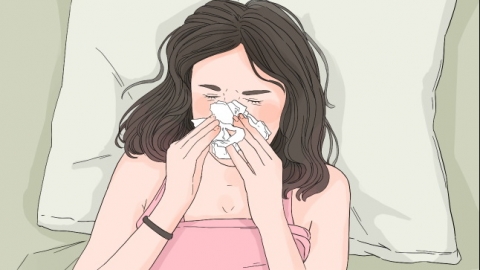Why isn't my cold and cough getting better?
Generally, a persistent cough caused by a cold may be due to environmental irritants, incomplete healing of damaged mucosa in the trachea, acute tracheobronchitis, pharyngitis, or postnasal drip syndrome. The solution depends on the specific cause and prompt medical attention is necessary, following medical advice for treatment. Details are as follows:

1. Environmental Irritants: During a cold, exposure to dust, cold air, or irritating odors may cause an irritative dry cough. These irritants act on the respiratory mucosa, causing mucosal congestion, edema, and inflammatory reactions, thus triggering the cough reflex. It is necessary to improve the environment and avoid or reduce contact with these irritants.
2. Incomplete Healing of Damaged Mucosa in the Trachea: During a cold, the mucosa inside the trachea may be easily infected by viruses or bacteria, leading to damage. If the mucosa does not fully heal after the cold subsides, coughing may persist. Adequate rest, increased water intake, and avoiding irritating foods are recommended.
3. Acute Tracheobronchitis: A cold may trigger acute tracheobronchitis, causing persistent cough and prolonged illness. Pathogenic microorganisms infect the trachea and bronchi, causing mucosal congestion, edema, and inflammatory reactions that stimulate cough receptors, possibly accompanied by fever. Medications such as dextromethorphan hydrobromide tablets, ambroxol hydrochloride oral solution, azithromycin tablets, etc., may be used following medical advice.
4. Pharyngitis: During a cold, bacterial or viral infection may lead to long-standing inflammation in the throat. The pharyngeal mucosa becomes congested and swollen, producing a foreign body sensation or irritative cough. This type of cough usually presents as a dry cough or with minimal sputum and may persist for a long time. Anti-infective treatment with medications such as cetylpyridinium iodine lozenges, cefuroxime axetil tablets, oseltamivir phosphate granules, etc., may be used under medical guidance.
5. Postnasal Drip Syndrome: Inflammatory substances and pathogens in nasal secretions irritate the throat mucosa, triggering the cough reflex. During a cold, nasal mucosa becomes congested and secretions increase. When nasal secretions flow backward into the throat area, they stimulate cough receptors in the throat, causing coughing, possibly accompanied by rhinorrhea. Medications such as amoxicillin granules, loratadine tablets, cetirizine hydrochloride drops, etc., may be used following medical advice to achieve anti-inflammatory and antiallergic effects.
During treatment, it is important to follow medical instructions, take medications on time, and adjust lifestyle habits and dietary habits to promote recovery.
References:
[1] Ge Junbo, Xu Yongjian, Wang Chen. Internal Medicine [M]. 9th edition. Beijing: People's Medical Publishing House, 2018:37-44.
[2] Asthma Group, Respiratory Diseases Society, Chinese Medical Association. Guidelines for the Diagnosis and Treatment of Cough (2021) [J]. Chinese Journal of Tuberculosis and Respiratory Diseases, 2021.






